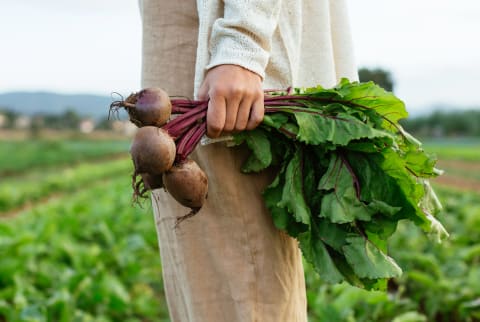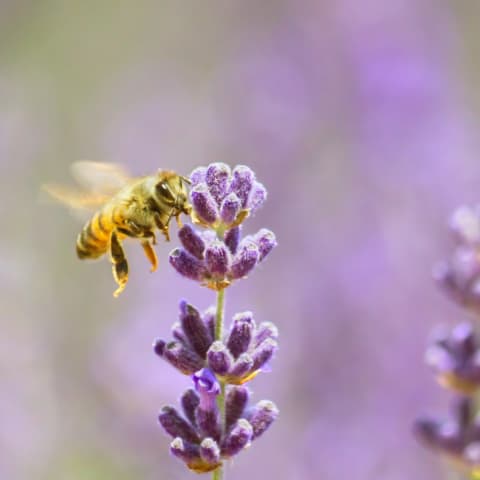Advertisement

There's no denying we live in a culture that finally values self-care—even as far as collectively practicing on Sundays (looking at you, Instagram and Twitter!). And we'll be the first to admit that self-care matters: In a perfect storm of pouring out our energy to loved ones, careers, endless to-do lists, and life's curveballs, acts of self-care help us stay anchored and keep our cups filled.
We're also living at a time when it's more important than ever to take care of our planet. And though the large-scale efforts needed to reverse shifting weather patterns, the water crisis, and so on might seem overwhelming, experts agree that individual action—even tiny tweaks to our daily life—is just what it takes to turn things around.
Rethink self-care (as earth-care!).
The good news is that there are lots of ways to actively participate in both nourishing our spirit and practically caring for the earth. Need a little inspiration? Read on below for three self-care ideas that involve simple acts of kindness for our earth:
Grow your favorite herbs or flowers, or lend a hand at your local farm or rooftop garden.
Hear us out: Gardening doesn't have to be an intense, time-consuming activity. If you've got a yard and the space for it, just the practice of tending to a few of your favorite flowers or herbs and watching its transformation isn't just calming and mood-boosting, but it can help remind you to slow down, practice mindfulness, and meditate on growth and life's seasons.
If you're an apartment dweller or don't have space for a garden, you can still reap the benefits of connecting with nature and doing your part by volunteering at a local garden. Using your hands to help harvest produce from the earth's soil, you'll engage your senses, feel a deep connection with the world around us through the foods we eat, and—according to the wide research done on the effects of spending time in a nature-rich environment—feel less stressed, more creative, and just plain happier.

Beyond getting to cook with veg and herbs that are 100 percent local and have traveled zero miles to get to your kitchen, planting a variety of flowers like calendula, lavender, and marigolds, and herbs like mint, rosemary, oregano, and thyme helps give the declining honeybee population and other pollinators a pesticide-free source of food. Bee extinction rates are currently 1,000 times higher than at other times in history, according to the E.O. Wilson Biodiversity Foundation. The conservation partner of Burt's Bees is now mapping 6,000 species of vital bee populations—one of the beauty and skin care brand's biggest environmental causes.
Make one plant-based meal a day.
You've heard this before, and it won't be the last time: Reducing your meat intake and embracing a plant-based diet is one of the best things you can do for both your health and the environment.
"Global consumption of fruits, vegetables, nuts, and legumes will have to double, and consumption of foods such as red meat and sugar will have to be reduced by more than 50 percent," reads the 2019 summary report from the EAT-Lancet Commission, a group formed to research the future of food and sustainability. The team—which includes specialists from 16 different countries in fields like agriculture, nutrition, and the environment—were tasked with creating guidelines for a planetary health diet. That diet is comprised of 50 percent fruits and vegetables and 50 percent a mix of plant protein, plant oils, and whole grains. Their report notes that animal protein should be optional and consumed very minimally.
Here's why: The U.N.'s Food and Agriculture Organization estimates that the meat industry alone generates almost one-fifth of the man-made greenhouse gas emissions that are contributing to climate change. What's more, producing meat also uses up a ton of water—up to 2,500 gallons of water go into making a single pound of beef.
Besides the environmental impact, the case against factory farms and inhumane treatment of animals raised for food is another solid reason to consider leaning toward more plant-based meals whenever we can.
So for the omnivores out there, set an intention of eating fully plant-based during one meal a day—even going meatless one day a week for a year is the equivalent of not driving for three entire months. Check out some of our food director's favorite veggie-heavy recipes for a little inspiration.
Start building a sustainable beauty regimen.
These days, more and more brands like Burt's Bees are doing their part in protecting the future of the planet, so it's easier than ever to build a skin care routine with products that use more responsibly sourced ingredients. Do your research to see what your favorite brands are doing to help nurture and save the environment: Chances are you already own a stick of Burt's Bees Lip Balm—that's great news because you're supporting a company that's invested in making greener moves, from trimming up to 50 percent of excess packaging in their products to committing to sustainable practices in their manufacturing. Not to mention their lip balm tubes are recyclable, either through Burt's Bees' Recycle on Us program or TerraCycle. Start small, and you can begin to make an impact with a routine you're already doing every day.
That's big, force-of-nature thinking—even if the ritual feels small and inconsequential. Make 2019 the year you practice self-care that also cares for the planet. Because if a regular self-care practice can radically change your life, just imagine what it can do for the planet, too.
